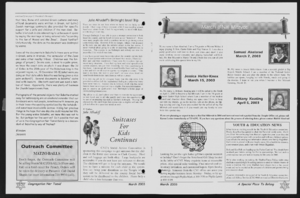Search the Special Collections and Archives Portal
Search Results
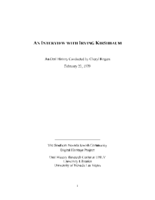
Transcript of interview with Irving Kirshbaum by Cheryl Rogers, February 23, 1979
Date
Archival Collection
Description
Interview with Irving Kirshbaum by Cheryl Rogers on February 23, 1979. In this interview, Kirshbaum discusses the Riviera Hotel where he began working in 1955. He also talks about the landscape of the Las Vegas Strip in the 1950s, and the state of gambling, comps, customer service, and dealer training. The interviewer asks about the treatment of minorities at the Riviera, and in Las Vegas generally, and the effect of corporate ownership on casinos.
Text
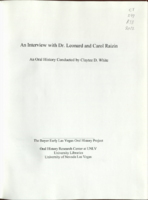
Transcript of interview with Dr. Leonard and Carol Raizen by Claytee D. White, April 8, 2009
Date
Archival Collection
Description
Leonard Raizin was born in Windsor, Ontario, Canada in 1930. His father was a cattle dealer. At an early age Raizin knew he wanted to be a doctor and after attending medical school he married his wife Carol Raizin born in Toronto, Canada. Leonard Raizin attended the University of Toronto for medical school in 1948. He met his wife Carol on a blind date. He started his internship at Sinai Hospital of Detroit in 1954. After a trip to Arizona and a feel of the desert weather the Raizins' with their four young daughters moved to Las Vegas, NV in 1961. When arriving in Las Vegas Dr. Raizin practiced at Southern Nevada Memorial Hospital (currently University Medical Center) and also at Sunrise as an anesthesiologist. There was a time while practicing in Las Vegas Dr. Raizin was the only anesthesiologist in the area, and experienced for the first 6 months of life in Las Vegas an extremely immersed schedule that never allowed him an entire night at home. Carol Raizin graduated as one of the first students at UNLV with a degree in Psychology in 1973. Carol eventually worked alongside her husband in their office handling bookkeeping for eight anesthesiologists. Dr. Leonard Raizin and Carol Raizin after a very successful life in Las Vegas are now retired. They still have a home in the Las Vegas area, however they spend their winters skiing in Park City, Utah and their summers fishing in Idaho.
Text
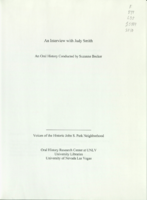
Transcript of interview with Judy Smith by Suzanne Becker, November 22, 2008
Date
Archival Collection
Description
Judy Smith was a teenager when her family relocated from Barstow, CA to Las Vegas in 1958. It was a wide open setting, an ideal location for riding her horse. It was also an era of growth as the city became a gambling destination and the Strip became dotted with early casinos and hotels. Judy attended Las Vegas High School, worked for the Las Vegas Sun and earned a scholarship to UNR. By 1967, she was married and moving back to Vegas with her young family. They chose the John S. Park Neighborhood as the place to call home. For Judy living in John S. Park is about a "sense of place" and "a sense of timelessness." She describer the evolution of the neighborhood and the greater Las Vegas community from the pioneers to the contemporary leaders. In 2006, Judy's home was gutted by a fire. Her life was saved by an observant neighbor. She could have relocated at the time, but chose not to move from the area that she has called home for over 40 years.
Text
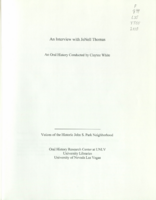
Transcript of interview with JoNell Thomas by Claytee White, January 12, 2010
Date
Archival Collection
Description
JoNell Thomas grew up in a large Utah family, went to Utah State and law school at University of Utah. She moved to Nevada in 1992; first as with the Nevada Supreme Court and then as a staff attorney with a Las Vegas firm, and currently is an attorney with the Clark County Special Public Defender's office. She and her husband, Billy Logan and their twin daughters have lived in the John S. Park Neighborhood since 2001. Their residence was constructed in 1956 on a large corner lot with lots of trees and a fifty-year-old swimming pool. JoNell offers her observations on a variety of JSP events: Stratosphere's failed rollercoaster across the Strip idea; the proposed high-rise complexes; the Monorail lack of convenience to locals; effects of dropping home prices and downturn of economy; the homeless population and closing of Circle Park. She helped create the early online community called the Downtown Neighbors website which provided information regarding , part activist, part pra
Text

Interview with William John Mayer, July 20, 2004
Date
Archival Collection
Description
Text

Interview with John Frederick Campbell, July 23, 2004
Date
Archival Collection
Description
Text

Interview with Charles Costa, February 13, 2009
Date
Archival Collection
Description
Text
James B. McDaniel Architectural Records
Identifier
Abstract
The James B. McDaniel Records (1960-1978) comprise the plans and drawings created by Las Vegas, Nevada architect James McDaniel who worked independently as James Brooks McDaniel Architect (from 1960-1978) and with a partner as Moffitt and McDaniel Architects, Limited (during the 1970s). This collection includes materials from over 115 projects managed by McDaniel. Records include oversized architectural drawings, and files of architectural projects. McDaniel designed many University of Nevada, Las Vegas (UNLV) buildings, residential, commercial, and landscape designs for Las Vegas clients. Also included are business files of construction estimates, specifications, invoices, change orders, and correspondence.
Archival Collection
Henderson Public Library Photograph Collection on Henderson, Nevada
Identifier
Abstract
The Henderson Public Library Photograph Collection on Henderson, Nevada (approximately 1940-1988) depicts life and growth in Southern Nevada. The collection documents the growth of Henderson, Nevada through images of Basic Magnesium Incorporated, housing throughout the area, and events. The documentation of Basic Magnesium Incorporated, its activites, personnel, and buildings from 1942 through 1944 is prominent in this collection.
Archival Collection

